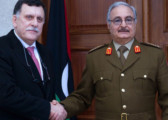
The treacherous way in which the Houthis got rid of former Yemeni president Ali Abdullah Saleh reaffirms the truth that this group can no longer be cohabitated, wrote UAE’s Al Khaleej. “This fact is evident in the brutal way in which the bloodthirsty group killed Saleh, who was, in the not-so-distant future, a close supporter and domestic ally of Al Houthis. He provided the group with political cover when it seized control of the Yemeni capital, Sana’a, three years ago. The act proves that Al Houthis are merely ruthless and treacherous thugs who will not abide by any agreement or promise. That is how Al Houthis have always been since they rebelled against the state and seized control of its institutions and army camps, which it used as a means to spill the blood of those who opposed them and be hostile against their Gulf and Arab surroundings.”
Saleh, the king of shifting alliances, was known as the man who ‘dances on the heads of snakes’, however, his last dance was his unmaking, wrote Lebanon’s Daily Star. “With the rebellion by the Iranian-backed Al Houthis, who announced their killing of Saleh, expected to be buoyed by this ‘victory’ and the legitimate army of President Abd Rabbo Mansour Hadi mobilising, Yemen is destined to be little more than a dhow lost on the high seas of bloodshed, and bloodshed only ...”
Following Saleh’s death, a teetering nation is sure to be put on the edge of an abyss, noted the Saudi Gazette.
“It is going to further muddle the Yemeni quagmire created by more than two-and-a-half years of civil war. The previous night, Saleh had officially announced the dissolution of his partnership with former Al Houthi militia allies. He had said in statements on Monday morning that, “Zero hour is coming to the battlefield in Sana’a ... The country had to be saved from the madness of Al Houthi group.” His words before being killed are ominous, for Yemen will have to unite in its efforts to blunt Al Houthi charge. Saleh’s death is definitely a turning point in Yemen’s history. But for now, it changes nothing for the millions of people suffering in the worst possible ways you could ever imagine. Saleh is dead, but the war continues, and is far from over.”
Taking into consideration the complexities of the Yemeni crisis, as well as the security, military, popular and tribal support that Saleh enjoyed, we realise that Monday’s development may be more dangerous than previous ones, said the London-based Pan-Arab paper Asharq Al Awsat. “He was not a regular player on the Yemeni scene. He was the great boxer, who dealt punches and received them. He bent to the will of the storm and then stood up straight again. He launched cannons and then mobilised mediators. Saleh’s story cannot be separated from the thorny issue of Yemen that goes back to the past four decades. He was the focal point of this story and his absence will open a new chapter in this tragedy. Who knows, perhaps his blood would tighten the noose around Al Houthis if the legitimate forces come together with the supporters of the General People’s Congress and if the tribes mobilise against the militias that are trying to impose themselves on the country. They will, however, fail to alter Yemen’s Arab identity.”





_resources1_16a31069e4e_small.jpg)





